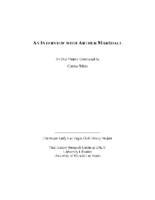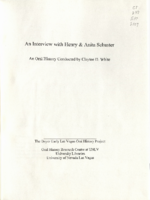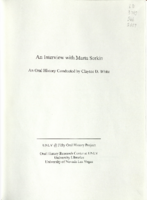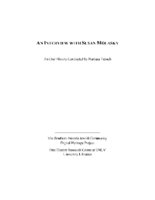Search the Special Collections and Archives Portal
Search Results

Transcript of interview with Joshua Abbey by Barbara Tabach, June 6, 2016
Date
Archival Collection
Description
Joshua Nathaniel Abbey was born in 1956 to artist Rita Deanin Abbey and author Edward Abbey. While much of Joshua?s early childhood was spent in the southwest following his father?s job, Hoboken, New Jersey, was where he attended elementary school and where his Jewish foundation took shape with his maternal grandparents. In 1964, the Abbey family moved westward again to Las Vegas. Though his father moved on and became a distant influence on Joshua?s life, his mother, Rita, remained and became an artist and art instructor at UNLV. Upon graduating from Las Vegas? Valley High School, Joshua set his sights on an acting career. His creative and industrious energies would inspire him to move about: from Los Angeles to New York and back to Las Vegas. He traveled the world, met the love of his life Yve Eiholzer-Abbey, a fellow Thespian. Eventually the couple made Las Vegas their permanent residence. In this interview, Josh recalls his life?s journey and the many career steps, friendships and accomplishments he has experienced along the path. Among Josh?s local contributions is the creation the Las Vegas Jewish Film Festival, which began in 2001. He also was founder of CineVegas Film Festival in 1998; a member of the Nevada Arts Council, City of Las Vegas Arts Commission and Director of the Desert Space Foundation, a local non-profit foundation committed to assisting emerging arts groups. He has also worked with Blue Man Group, for Jewish Family Service Agency, had a brief speaking part in the movie, The Natural, and been an activist opposing the Yucca Mountain waste repository-and much more. Joshua is a graduate of University of Nevada Las Vegas (Theater Arts 1980) and American Film Institute (1993).
Text

Transcript of interview with Doug Unger by Barbara Tabach, August 26, 2014
Date
Archival Collection
Description
Interview with Doug Unger by Barbara Tabach on August 26, 2014. In the interview, Unger discusses his schooling, his family's mattress business, and his endeavors in the company and the mattress industry in Las Vegas. Unger becomes involved in Holocaust education and the Sperling Kronberg Mack Holocaust Resource Center.
Doug Unger was born in Cleveland, Ohio, and grew up working summers in a mattress factory, a family business started by his maternal grandfather. After graduating from high school in Cleveland, Doug attended the University of Cincinnati until moving to Steamboat Springs, and enrolled in Denver University, though ended his college career one class away from graduation. Eventually, Unger moved back to Cleveland, then to Las Vegas. In 1976, Dough bought Supreme Mattress and moved to Las Vegas to build his new business. Outside his successful career, Doug was always an active member in the city's Jewish community. He joined Congregation Ner Tamid, where he was a trustee. He became involved with the Jewish Federation, serving as treasurer and later as president. When he moved to Reno, Doug joined Temples Sinai and Emanu-el, and also became heavily involved with Guide Dogs for the Blind Friends Committee, serving as its director for a period of time. He was also the co-chair of the Governor's Advisory Council on Education Related to the Holocaust (GAC). Doug was instrumental in establishing the Library for Holocaust Studies as a successful organization, independent of the Jewish Federation. The Library is now located in its own, donated space, run by trained staff, and receives $200,000 from the state biennially.
Text

Transcript of interview with Myra Berkovits by Barbara Tabach, August 21, 2014
Date
Archival Collection
Description
Interview with Myra Berkovits by Barbara Tabach on August 21, 2014. In this interview, Berkovits talks about growing up and starting her teaching career in Chicago. When she moves to Las Vegas, Berkovits eventually purchases a dining concierge business, but returned to teaching, and is now involved with the Sperling Kronberg Mack Holocaust Resource Center.
Myra Berkovits was born Myra Mosse in 1944 in Chicago, Illinois. She became an elementary school teacher in Chicago before moving to Las Vegas in 1980. Myra has made contributions to Las Vegas in the public and private sectors. She owned several businesses then returned to teaching, heading to the University of Nevada, Las Vegas (UNLV) to renew her teaching license and later received her master's degree. After a year of teaching in multicultural education, Myra was then in charge of the school district's homeless program, seeing its growth from serving 1,200 to 6,000 students. Myra's other passion was for Holocaust education and she became one of six interviewers in the city for the Shoah Foundation, documenting survivors' stories. One interviewee, David Berkovits, would later become her husband of fifteen years. Myra's own Holocaust education was aided by powerful trips to Israel and Poland. She used these experiences to develop and lead student-teacher conferences and classroom curriculum for the whole state. Myra still serves at the Education Specialist at the Holocaust Resource Center.
Text

Transcript of interview with Arthur "Art" Marshall by Claytee D. White, February 11, 2014
Date
Archival Collection
Description
Interview with Arthur "Art" Marshall by Claytee White on February 11, 2014. In this interview, Marshall
Arthur Marshall was born in 1929 in Cleveland, Ohio. He met his wife, Jayn in 1953, and the couple moved to Las Vegas where she already lived with her family. Art joined his father-in-law in the family's retail clothing business. Art Marshall took over the retail clothing business with his brother-in-law, Herb Rousso, and expanded operations as Marshall-Rousso stores. Art quickly became very active in the Jewish community upon arriving in Las Vegas. He served as president at Temple Beth Sholom, and worked with other Jews in the city, many who owned and managed the hotels at the time, to build a strong Jewish community in Las Vegas. He served as the chairman of Nevada State Bank and spent 12 years on the Nevada Gaming Commission.
Text

Transcript of interview with Henry and Anita Schuster by Claytee White, March-April 2011
Date
Archival Collection
Description
In this oral history, the long married couple Henry and Anita Schuster recall the history of the 1930s and how they eventually met and created a life together. Their childhoods were distinctively different, but charter a future where they would inevitably meet. Born in Germany in 1926, Henry recalls the dawn of Hitler and the Nazism. His mother would arrange for his evacuation to France, where he would not know her fate or that of his two sisters for a number of years. Along with hundreds of other displaced children, he escaped to America and lived with relatives in Louisiana where he finished his schooling and joined the US Army. Anita on the other hand grew up with her family in New York. They share the story of meeting when she was 16, falling in love and marrying in 1948. They had four children and moved several times before settling in California. They retired to Las Vegas in 1993. Henry's recollections include childhood memories of the Holocaust and its affect on his family, including the loss of his mother and one of his sisters. Finding his surviving sister Bertel (Betty Kale) after the war is a heartwarming tale of survival. The Schusters are part of the approximately 300 members of the Holocaust Survivor Group that has settled in southern Nevada and Henry was President Emeritus of the group. He published his memoir, Abraham's Son-the Making of an American, in 2010.
Text

Transcript of interview with Marta Sorkin by Claytee White, March 2, 2009
Date
Archival Collection
Description
In this interview, conducted for the 50th anniversary of UNLV, Marta Sorkin discusses her family and her experience moving to California, and then to Las Vegas. Sorkin worked at the James R. Dickinson Library at UNLV and later in Lied Library, helping to implement and update various databases, and create displays on current topics. She briefly discusses her involvement with Hillel and the Jewish Federation of Las Vegas.
Marta Sorkin begins by reminiscing about her childhood in Far Rockaway Long Island, New York. She details the life her parents lived, which set an example for Marta and her two siblings. Through hard work, advanced education, and involvement in causes that were important to them, they created the template by which Marta lives her life. Marta describes her early work history, which included modeling, sales, library work, and working part time in her father's dry-cleaning plant. She and her daughter were living with her parents for a time in California, and they visited Las Vegas on weekends. It was during one of those visits that Marta met her second husband-to-be. They eventually married and decided to settle in Las Vegas. In Las Vegas, Marta enrolled at UNLV, became involved with the Preservation Association of Clark County, and volunteered at the Jewish Federation of Las Vegas. In addition, she completed her BA and MA degrees at UNLV and started working at the university's library. She details her work there, including creating display cases, working in the reference section, doing research for students and faculty, and compiling interviews. Marta also describes the fundraisers she spearheaded to help raise money for the various societies she was involved with: non-events, pancake breakfasts, dinners, and dance and band performances. In her closing comments she mentions an interview she did for Ralph Roske's class and expresses her appreciation for the career she's had at UNLV.
Text

Transcript of interviews with Al Levy by Cheryl Caples, February 23, 1979 and by Martha Zehnder, March 8, 1981
Date
Archival Collection
Description
Part I: Interview with Al Levy by Cheryl Caples on February 23, 1979. At the time of this interview, Levy was serving on the city commission (now the Las Vegas City Council). He talks about growing up in Las Vegas and attending Las Vegas Grammar School (Fifth Street School) and Las Vegas High School. He mentions the Helldorado events, recreational activities, and raising a family in Las Vegas. Part II: Interview with Al Levy by Martha Zehnder on March 8, 1981. Levy recalls much of the same information as the previous interview, and again talks about his schooling and attending the University of Southern California. He returned to Las Vegas to assist his father with his grocery stores. Levy talks about the polio epidemic as the reason that children were not allowed to swim at public or hotel pools. He discusses his real estate firm, Levy Realty Company, his involvement in the community and the Jaycees (Junior Chamber of Commerce), and the booming hotel industry. Levy also discusses some city leaders he's known, including Mayor Gragson. He talks about his Jewish faith and having to go to Los Angeles to train for his bar mitzvah because there were no rabbis living in Las Vegas.
Text
Transcript of interview with Hank Greenspun by Perry Kaufman, 1975
Date
Archival Collection
Description
Hank Greenspun discusses coming to Las Vegas in the 1940s, his journalistic endeavors, and some of the politics that affected him.
No release form is on file for this interview. The interview is accessible onsite only, and researchers must seek permission from the interviewee or heirs for quotation, reproduction, or publication. Please contact special.collections@unlv.edu for further information.
Text

Transcript of interview with Andrew and Debbie Levy by Barbara Tabach, September 12, 2016
Date
Archival Collection
Description
Andrew (Drew) Levy was born and raised in Las Vegas, Nevada, where his family became prominent civic and real estate leaders. His grandfather was Harry Levy, a former Las Vegas City Commissioner, and his father Alvin Levy was a former councilman. Drew is always proud to say that he never left Las Vegas and of partnering with his father in the Levy Realty Company. While growing up, Drew it was easy for a teenager to enjoy the perks that could accompany his family?s civic persona?such as casino shows, events and meeting early Las Vegas casino executives like Moe Dalitz. After graduation from Clark High School, Drew attended Arizona State University. It was in Tempe that he met Debbie Cheek, his future wife. When Debbie arrived in Las Vegas, she enrolled at the University of Nevada, Las Vegas, where she finished her degree and started her accounting practice. She ran her business for ten years before opening Art Starts Here, an art school. In the 1990s, Debbie?s passion for art led her to be involved in the creation of First Friday, a local monthly art festival. She also teaches a summer art camp for the Adelson Educational Campus. Drew and Debbie became deeply involved in the many Jewish congregations in Las Vegas. Blossoming first at Temple Beth Sholom where they were married in 1980, Debbie sat on the preschool board and oversaw the temple board, while Drew was the advisor for the youth group. The couple later joined Congregation Ner Tamid where Drew was congregation president from 1999 to 2000 and Debbie was board treasurer in 2001. Debbie includes stories of her conversion to Judaism and keeping kosher. In this interview, Drew and Debbie Levy reflect on changes they see in Las Vegas, from when Drew was a kid to the times they raised their own daughters, Sarah and Jenna, here. Looking at the larger picture of the city, they describe booms in the real estate market and growth in the artistic and cultural aspects of Las Vegas. They provide a perspective of the growth of the local Jewish community.
Text

